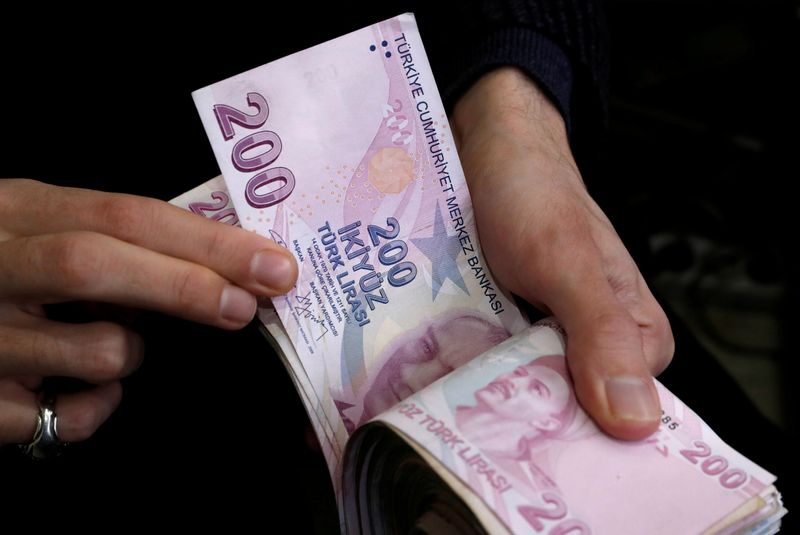By Gabriel Burin and Vuyani Ndaba
BUENOS AIRES/JOHANNESBURG (Reuters) - Emerging market currencies are at significant risk of weakening this month as the coronavirus epidemic expands, putting pressure on policymakers to step up efforts to prevent further economic damage, a Reuters poll showed.
The about-face in fortunes comes just weeks after these currencies climbed to their strongest rates in 1-1/2 years following an initial Washington-Beijing trade agreement after nearly two years of escalating tariffs.
Forty-six of 52 market strategists and analysts polled Jan. 31-Feb. 4 said currencies from key emerging markets - most of which export raw materials to China - are at risk of weakening further in the near-term as money rushes to safe havens. [EUR/POLL]
That includes the South African rand , the Turkish lira and others as the Japanese yen and Swiss franc (EURCHF=) firm on fears the flu-like virus that has claimed over 400 lives in China could worsen.
Emerging market currencies may be prone to additional pain once it becomes clear how restrictions introduced to control the epidemic could hurt growth in the world's second largest economy, and consequently its trading partners too.
"Both safe-haven demand and shocks on commodities-linked economies from the coronavirus in China imply more significant risks to emerging markets in the short run," said Simon Harvey, FX Market Analyst at Monex Europe.
"While risk-off moves could trigger additional pressure on the yuan in the short term, a broader drag of the coronavirus on the currency will depend on its lagged economic impact, which is unlikely to be fully unfolded in the following weeks".
A basket of emerging market currencies (MIEM00000CUS) has lost close to 1.5% since mid-January, when the asset class was first hit by fears about the contagion, dropping to its lowest in more than a month.
The rand, usually the whipping boy for global risk sentiment, already racked up losses last week when traders and investors flew to safer havens.
South Africa's currency has bounced back a bit since but is likely to relapse if risks worsen, with plenty of domestic economic challenges building already.
"The rand risks approaching, and exceeding, 16/$ this quarter if South Africa looks increasingly likely to see a Moody's downgrade, given that the domestic currency has already reached a low base on the back of the impact from the virus on risky assets," said Annabel Bishop, chief economist at Investec in Johannesburg.
South Africa is due a credit review at the end of next month. Investors will automatically sell its bonds if Moody's lowers its sovereign rating to junk.
Emerging market peer Argentina is already asking its debt-holders to accept a late but bigger repayment to avoid falling into default.
LIMITED PESSIMISM
In particular, the Chinese yuan may sink as much as 3% in February if the health crisis aggravates, potentially disrupting international markets, according to replies to a separate question in the poll.
"We remain of the view that it is too early to abandon a cautious approach towards risky EM assets as there is no sufficient evidence yet - despite various measures being implemented - that the deadly virus has been contained," said Piotr Matys, senior emerging markets FX strategist at Rabobank.
So far the pessimism is cushioned by the view policymakers may act with stimulus in case financial conditions worsen considerably or already sluggish world growth slows more, after top officials expressed concerns last week.
China's central bank said it will inject 1.2 trillion yuan ($174 billion) worth of liquidity into the markets via reverse repo operations on Monday and Chinese policymakers are readying other measures too, sources told Reuters.
For the time being, the U.S. Federal Reserve seems poised to stay on hold. Chair Jerome Powell said last month after the Fed's latest policy meeting that it was "too early" to determine the impact of the virus.
(Polling by Manjul Paul and Sujith Pai in BENGALURU, Vuyani Ndaba in JOHANNESBURG and Gabriel Burin in BUENOS AIRES; Editing by Ross Finley and Angus MacSwan)
